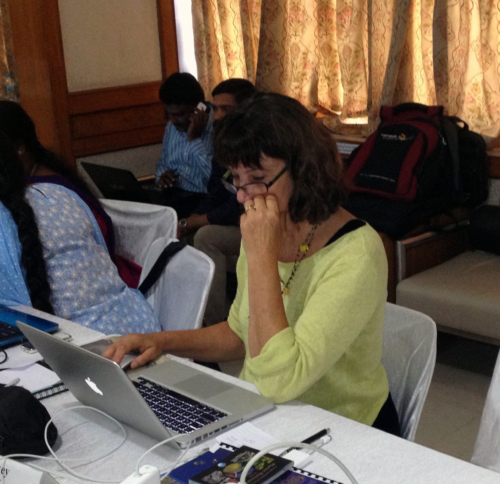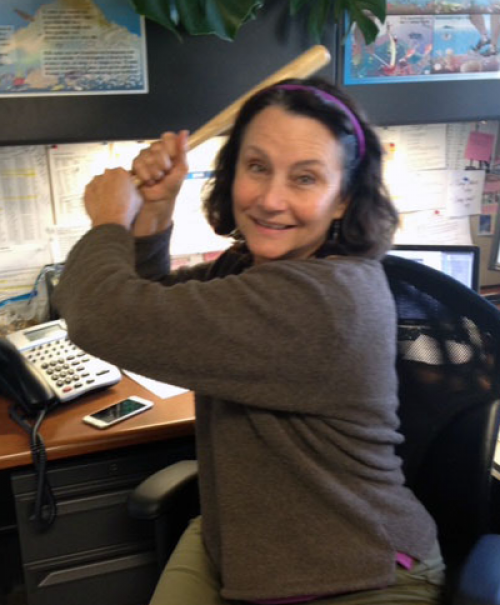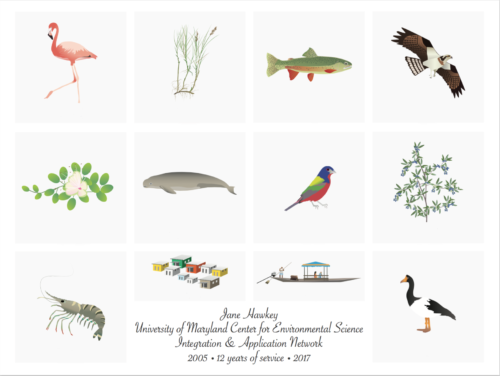Jane Hawkey, the Integration and Application Network ‘Closer’ retiring
Bill Dennison · | Environmental Report Cards | Science Communication | 1 commentsBefore starting at the Integration and Application Network (IAN) in 2005, Jane Hawkey worked for Washington Sea Grant, and then as a research assistant for several different Horn Point Laboratory faculty. There, she attended research cruises, produced newsletters and helped with publication graphics. These skills and experiences helped her when she joined IAN. She rose to IAN Senior Science Communicator within a short time period. Known as the 'Closer,' she was able to finish projects in a timely manner, while maintaining the highest quality.


Jane traveled widely as part of her work with IAN. She co-taught a science communication course in Portugal, helped run a science communication workshop in Zanzibar, Tanzania, produced report cards and integrated assessments in coastal India, and developed science communication products throughout the Pacific islands. Jane enjoyed the immersive learning and exploration that comes from experiencing new places and meeting new people.

Simon Costanzo hosted a bittersweet farewell party for Jane. The rest of us presented her with a framed poster of a dozen symbols that Jane had created throughout her tenure at IAN. These symbols were arranged by Brianne Walsh, who did a wonderfully artistic job.
After the poster's presentation, I read her a poem as follows:
The Closer
25 June 2017
William C. Dennison
When we needed something done, and it needed to be good
We turned to the one we called the Closer, because we could
This Closer was our secret weapon of choice
Because when she finished, we could all rejoice.
We sent our Closer all over the place
So that she could meet with people face-to-face
The Closer would listen to concepts that were somewhat vague
But somehow avoid fuzzy communication products like the plague.
The Closer traveled to Guam, Saipan and American Samoa
She also went to Mumbai, Chilika Lake, and even Goa
The Closer went to places near and far
Places like Assateague, Portugal and Zanzibar.
Sometimes the Closer would bring along John
He was always up to traveling hither and yon
We knew we could count on a product, if we picked the right one
Because with the Closer, she would really get stuff done.
She could roll with the punches and change mid-course
The Closer could track down any information source
She was relentless but with a smile on her face
The Closer enjoyed working at a fast pace.
If you assembled the Closer’s final products
They would resemble Da Vinci’s famous codex
Diagrams of everything imaginable under the sun
An opus of effort when all was said and done.
As the Closer sails off with John to explore the earth
Continuing to live their lives for all their worth
She leaves behind a science communication legacy
The Integration and Application Network Closer, Jane Hawkey.

However, there is still some good news. Jane still plans to work with us on a contractual part time basis after some well-earned family travel. She will try to fit in some time among her offshore sailing cruises, trips to Mexico, and local Easton Point activities. We are glad that Jane will continue to be available, albeit intermittently, and we look forward to hearing about her retirement activities and trips.

About the author
Bill Dennison

Dr. Bill Dennison is a Professor of Marine Science and Vice President for Science Application at the University of Maryland Center for Environmental Science.
Next Post > Don Boesch, the Coastal Scholar, steps down after 27 years
Comments
-
Damavand 9 years ago
Hi there! I could have sworen I've visited this website before but aftewr browsing through some of the articles
I realized it's nnew to me. Regardless, I'm certainly delighted I found it and I'll be bookmarking it
and checking back frequently!